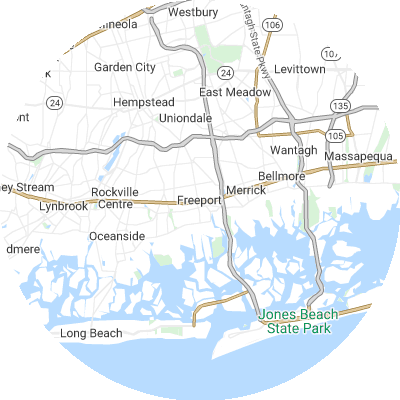Please enter a valid 5-digit zip code!
Written By David Cusick
Last Updated April 2024
Solar is one of the most easily accessible forms of renewable energy for Freeport homes. Making the switch to solar power helps cut your utility bills and lower your environmental impact. But you'll want to find a qualified installation company first. Luckily, we've done the research and created a guide to the best and most reliable solar installation providers in Freeport.
Free quotes
Informative resources
Reliable customer support
Clear pricing policy
Services Offered
Clear pricing policy
Free quotes
Informative resources
Reliable customer support
Services Offered
Reliable customer support
Free quotes
Clear pricing policy
Informative resources
Services Offered
Prompt service delivery
Clear pricing policy
Informative resources
Free quotes
Reliable customer support
Services Offered
Clear pricing policy
Prompt service delivery
Reliable customer support
Free quotes
Services Offered
Reliable customer support
Clear pricing policy
Free quotes
Services Offered
Reliable customer support
Informative resources
Clear pricing policy
Free quotes
Services Offered
Free quotes
Clear pricing policy
Informative resources
Reliable customer support
Services Offered
Reliable customer support
Free quotes
Clear pricing policy
Informative resources
Services Offered
Clear pricing policy
Free quotes
Informative resources
Reliable customer support
Services Offered
Today's Homeowner looks at dozens of datapoints on solar companies to come up with our data-driven rankings. It's not possible for a company to pay for preferential treatment in our rankings. We look at the following key factors in determining who should top our list:
Installing solar panels can lower your electricity costs and help the environment by reducing your carbon footprint. When determining whether a solar provider is the best option for you, consider these key factors.
It's imperative that your solar installer has the proper licensing. This ensures that the work is done correctly using current installation best practices. New York regulators do not issue licenses to contractors, so you should check with your city or county government for its specific regulations and requirements.
Check review sites like Google Reviews, the Better Business Bureau (BBB), and TrustPilot to see feedback from past customers on local solar companies. Detailed reviews can help you evaluate a company's dependability and customer service. Use caution with companies that have very few reviews or mostly negative ones.
Get free, detailed quotes from at least three solar companies. A quote should list all costs and identify the exact solar parts included. Comparing several quotes can help you find the option that best fits your budget.
Top-notch solar installations should come with strong workmanship and performance guarantees. A workmanship warranty covers installation issues, such as poor wiring, cracks in the panels, or poor alignment. A performance warranty guarantees a minimum energy output. Comprehensive guarantees show that a solar company believes in its work.
Solar is great for helping you lower electricity bills over time. Make sure you consider these aspects when considering the final cost and value of solar panels.
In Freeport, solar panels cost an average of $3,650 per kilowatt, with an average system size of 3.8 kilowatts. The typical Freeport homeowner spends $9,833 on their solar array after federal tax refunds. An estimate from a local provider will consider additional information reflecting your desired system's required preliminary work, capacity, size, and panel type. In some cases, homeowners may prefer leasing solar panels to reduce upfront costs.
Incentive Type: Corporate Tax Credit
Incentive Amount:
$0.01/gallon for each percent of biodiesel
Incentive Type: Sales Tax Incentive
Incentive Amount:
100% exemption
Incentive Type: Sales Tax Incentive
Incentive Amount:
Upon local authorization, 100% exemption from local sales tax
Incentive Amount:
Incentive rates step down over time as MW goals are met. Incentive rates as of 11/27/2019 are:
Residential:
Long Island Region: $0.00/W (MW blocks have been fully subscribed)
Con Edison Region: $0.30/W
Upstate Region: $0.35/W
Low-to-Moderate income customers: $0.80/W (up to 10 kW)
Small Commercial (Non-Residential):Long Island Region: $0.00/W (MW blocks have been fully subscribed)
Con Edison Region: $0.60/W
Up State Region: $0.45/W
Multifamily Affordable Housing Adder: additional $0.40/W (up to 50 kW)
Incentive Amount:
Appliances
Advanced Power Strips: $10 - $20
Air Purifier: $25 - $50
Clothes Dryer: $50 - $250
Clothes Washer: $50
Dehumidifier: $30
Dishwasher: $50
Exhaust Fan: $20 - $25
Electric Freezer: $30
Heat Pump Water Heater: $650
Pool Pumps: $150 - $350
Refrigerator: $50
Refrigerator Recycling: $50
Lighting
Instant Rebates Vary by Product
Bulk Light Purchases: Up to $2 - $3/unit
Cooling & Heating
Central Air Conditioning: $450
Smart Thermostat: $85
Ground Source Heat Pump: $2,000/ton
A solar photovoltaic (PV) system can generate power to run any electric system or appliance in your home. If you don't want to use solar power for your entire home, you can install a solar heating system for your water.
There are many benefits to home solar energy. You can raise your property values, reduce emissions, and qualify for tax benefits. With the right storage equipment, solar panels can also give you further energy independence and offer some protection from power outages.
Yes, it's possible to use home solar energy alongside conventional power sources. In most parts of the country, solar panels are designed to supplement your existing energy sources, meaning that you can reap the environmental benefits and savings that come from using solar energy without having to completely switch over.
You might be pleasantly surprised at how quickly you can get a return on investment from your solar panels. The sun shines frequently in Freeport, meaning your payback period could last 11.5 years per 5 kW of capacity on the high end.
Net metering is a type of "power purchase agreement." If your utility or state offers net metering, you can return the solar energy you don't use to the grid. In return, they'll give you a credit on your power bill.
Yes, solar panels can still generate energy during a grid outage. To ensure that your solar system can keep working during a power outage, make sure to choose a quality solar provider and look for a solar system that includes a battery backup.
